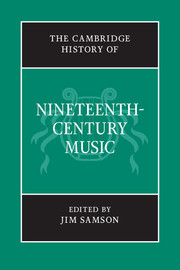Book contents
- Frontmatter
- Part One 1800–1850
- 1 The musical work and nineteenth-century history
- 2 Music And the rise of aesthetics
- 3 The profession of music
- 4 The opera industry
- 5 The construction of Beethoven
- 6 Music and the poetic
- 7 The invention of tradition
- 8 Choral music
- 9 The consumption of music
- 10 The great composer
- Part Two 1850–1900
- Chronology
- Institutions
- Personalia
- Index
- References
10 - The great composer
from Part One - 1800–1850
Published online by Cambridge University Press: 28 March 2008
- Frontmatter
- Part One 1800–1850
- 1 The musical work and nineteenth-century history
- 2 Music And the rise of aesthetics
- 3 The profession of music
- 4 The opera industry
- 5 The construction of Beethoven
- 6 Music and the poetic
- 7 The invention of tradition
- 8 Choral music
- 9 The consumption of music
- 10 The great composer
- Part Two 1850–1900
- Chronology
- Institutions
- Personalia
- Index
- References
Summary
On canons and spearheads
A focus on greatness is one of the markers of nineteenth-century culture. Indeed it was the nineteenth century that fostered and nurtured that fetishism of greatness – of the great artist, the great work – so familiar to us today. The language of music criticism in the early nineteenth century tells part of that story, registering a subtle shift from the acknowledgement of excellence to the recognition of greatness. This shading of meaning is worth elaborating. Excellence suggests pre-eminence in an enterprise whose terms of reference have been validated by convention. Greatness, on the other hand, implies an achievement or an aptitude so far beyond the ordinary that it is capable of remaking the conventions – resetting the terms on which future evaluations might be made. Excellence carries with it the sense of an object well made, a task well done. Greatness transcends the making, as also the function. It imposes itself on the world. It goes without saying that the nineteenth century did not initiate the concept of greatness. It flourished in the ancient world, and it was reinvented (partly through the mediation of Islamic culture) for the thinkers and makers of Renaissance humanism. And humanism is to the point, for it is the purely human that is honoured in a project of greatness, that capacity of the exceptional mind to speak for all, to celebrate our potencies, to express our emotions through the mystery of creative genius. It was above all during the Renaissance that creativity took on something of its modern, elevated, sense, not least through a swerve towards secular themes, which proved no less susceptible to the aura of creative genius than their sacred counterparts.
- Type
- Chapter
- Information
- The Cambridge History of Nineteenth-Century Music , pp. 259 - 284Publisher: Cambridge University PressPrint publication year: 2001
References
- 4
- Cited by

